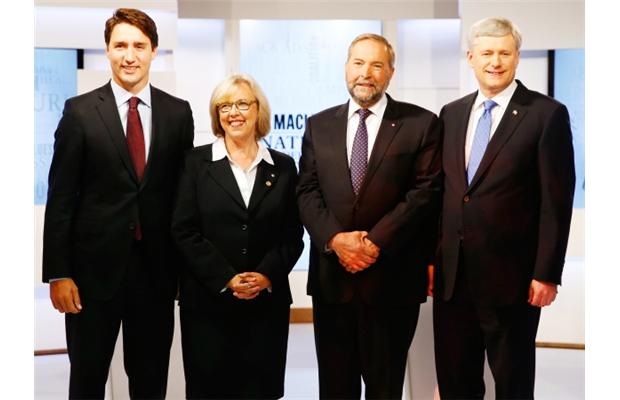BY JEFF LEE, VANCOUVER SUN
The Liberal party has gained momentum in the Metro Vancouver area at the expense of the New Democrats, even though the Conservatives still hold a small lead overall, according to a new Mainstreet/Postmedia poll.
With less than two weeks before the Oct. 19 federal election, the poll shows a tight three-way race still in place across B.C. among decided respondents, with the Conservatives static at 33 per cent, compared to the NDP at 29, down two, and the Liberals at 28 per cent, up two. The Green party also remains unchanged at 10 per cent support.
But the real story appears to be in the Metro Vancouver census metropolitan area, where the Liberals’ two-point gain translates into a five-point lead, according to Quito Maggi, president and CEO of Mainstreet Research.
That’s because the Conservatives are holding on to their traditional foothold in the Fraser Valley and rural B.C., while the NDP is slipping in support in urban areas, he said.
“I think it is hugely positive for the Liberals in the Vancouver Census Metropolitan Area,” said Maggi. “It is going to be very difficult for the NDP to hold on to what it has.”
In the 2011 election, the Conservatives took 21 of B.C.’s seats. The NDP held 12, the Liberals two and the Greens one. This election, six new ridings have been added, primarily in Metro Vancouver.
The B.C. results are part of a national poll Mainstreet Research conducted between Oct. 6-7 of 5,630 Canadians. It shows 33 per cent of voters nationally favouring the Conservative party, with the Liberals close behind at 31 per cent. Now distinctly in the rear, the New Democratic Party had just 18 per cent support.
Furthermore, 36 per cent of “leaning and decided” voters backed the Conservatives, with the Liberals at 35 per cent. The NDP had just 20 per cent support among this group.
The Liberals’ six-point gain comes exclusively at the expense of the NDP (down four) and the Greens (down two).
In Quebec, four per cent of those leaning and decided support the Bloc Quebecois, which is not running candidates elsewhere in Canada. The poll has a margin of error of 1.31 per cent, 19 times out of 20.
Maggi said the latest results show a trending decline in support for the NDP across Canada, particularly in Quebec and British Columbia.
NDP Leader Thomas Mulcair’s attempts to differentiate himself from Liberal Leader Justin Trudeau by aligning with Conservative Leader Stephen Harper on some issues may have backfired, he said.
“The one thing all pollsters have agreed on in this election is that between 65 and 70 per cent of the electorate want change,” Maggi said.
“I think the mistake in the NDP strategy that has brought us to this point is that essentially by differentiating from Justin Trudeau, the NDP have put Thomas Mulcair and Stephen Harper together. When that is the environment you are in, why would you side with a government that 70 per cent of people want to change?” The poll found that in Ontario, the Liberals now have a commanding lead over the Conservatives, 44 per cent to 37 per cent. While the Greens are statistically insignificant at five per cent, their 10 per cent support in B.C. is largely on Vancouver Island, where they have a magnified effect. Maggi said that could benefit Elizabeth May, the Green leader, who could add to her caucus.
When Mainstreet surveyed B.C. voters three weeks ago, it found that in the Metro Vancouver area, the Liberals led with 28 per cent, compared with 27 for the Conservatives and 23 per cent for the NDP. The undecided vote was about 16 per cent.
The full report can be found at mainstreetresearch.ca




